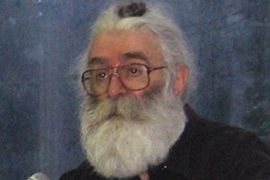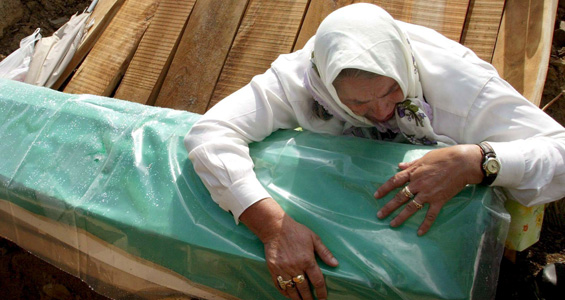My neighbour Radovan Karadzic
One Belgrade resident on living next door to Europe’s Most Wanted.

 |
| The former Bosnian Serb leader has been accused of organising the massacre of more than 7,500 Muslim men and boys in Srebrenica in 1995 [EPA] |
As Radovan Karadzic, the former Bosnian Serb leader, contemplates his fate after 13 years on the run, the people of Belgrade have been left wondering how he managed to live among them, un-noticed for so long.
Karadzic has been accused of organising the massacre of more than 7,500 Muslims in Srebrenica in 1995, along with other atrocities during the Bosnian War.
The police said he was arrested in a suburb of Belgrade late on Monday evening, but that he had been under surveillance for many weeks.
In 2007 Jasmina Tesanovic of the international peace network, the Women in Black, attended a ceremony in which the bodies of hundreds of victims of the Srebrenica massacre were re-buried.
Now she finds that she has been a neighbour to the man accused of organising those killings, and she tells her story to Al Jazeera…
| First person |
|
Karadzic is currently being held in the special court for war crimes in Belgrade, and faces extradition to the international war crimes tribunal in The Hague. Slobodan Milosevic preceded him in this same course some years ago. To judge by the chatter on my B92 blog and the phone messages I get from my friends, as I long suspected, “Europe’s Osama bin Laden” and I have been neighbours. Living shields We shared the same food and saw the same beggars in downtown Belgrade where he had been hiding all these years, disguised as a New Age quack. A journalist who lives close to me sent me a text message, pointing out that Karadzic must have been drinking beer with our gypsy neighbour in the street. As we all suspected, or as some of us surely knew, Karadzic was hiding from justice behind our names and our daily lives, using the Serbian population as his living shields. The new pro-European government in Serbia had to split with that covert policy. Thus do the democrats reward the long-suffering voters who gave them the lead against their nationalist rivals; even the ex-Milosevic Socialist party seems to be in on the deal. Radovan Karadzic, poet, psychiatrist and alleged war criminal, effectively vanished in 1996. His general, Ratko Mladic, is still on the run. Karadzic and Mladic were [allegedly] the architect and the builder of the genocide in Srebrenica, where up to 8,000 men and boys were killed in three days. Hushed reverence Now the long-missing fugitive has been formally interrogated at the special tribunal for war crimes in Belgrade. This is the same court where, two years ago, I followed the trial of the paramilitary group the Scorpions, participants in the genocide in Srebrenica. Karadzic’s name was often mentioned by their members with hushed reverence. A couple of months before the Scorpions were arrested in 2005, police raided the house of the Karadzic family, briefly arresting his son. On this occasion his wife publicly asked her husband to give himself up for justice. The myth around his dark character was that he would never give himself alive, but die a suicidal martyr for the sake of his family and the cause of the Bosnian Serbs. Karadzic never lacked supporters; shouting groups of right-wing hooligans spent the night outside the war crimes court, chanting his name and demanding that Boris Tadic, the president, commit suicide and therefore save Serbia. The militants were supervised by a heavy police presence and the crowd soon broke up. Delayed and obstructed International politicians such as Richard Holbrooke are congratulating the Serbian government for this important action – delayed and obstructed all these years. Men resembling Karadzic have often been reported in various parts of Serbia and Bosnia, and various alleged accomplices were brought to court for aiding and abetting both Karadzic and Mladic. It was obvious that they were both protected by powerful local allies, and it is presumed that Karadzic was arrested yesterday thanks to the betrayal of some insider. There is still an outstanding American bounty of five million dollars for the arrest of either Karadzic or Mladic; for 12 years the tempting hoard of cash was never claimed. Yugoslavia’s shattered ruins Karadzic is defending himself with silence – but not a complete silence. He has claimed that his arrest was a “farce,” and that he was detained three days ago by masked men, and kept prisoner in a small cell. According to officials, Karadzic, who is officially a Bosnian, has been living in Belgrade as a Serbian citizen, under a false identity, and with a new name – “Dragan Dabic”. “Dr Dabic” has been working as a doctor of “alternative medicine” in a private clinic. Thin, bespectacled, balding and heavily bearded, Dr Dabic was moving freely in Belgrade; workers at the clinic deny they knew his real identity but he seems to have been shadowed and arrested while trying to change apartments. The world is in deadly earnest about Radovan’s “farce,” as congratulations pour in for President Tadic, the police and the Serbian justice system. The Hague will never be popular in Serbia, especially when Bosnian alleged war criminal Naser Oric was released despite alleged attacks on Serbs. In the shattered ruins of Yugoslavia there will never be a neat equalising of the blame, but this event is a giant step toward a living role for a peaceful, democratic Serbia within a modern Europe.” |